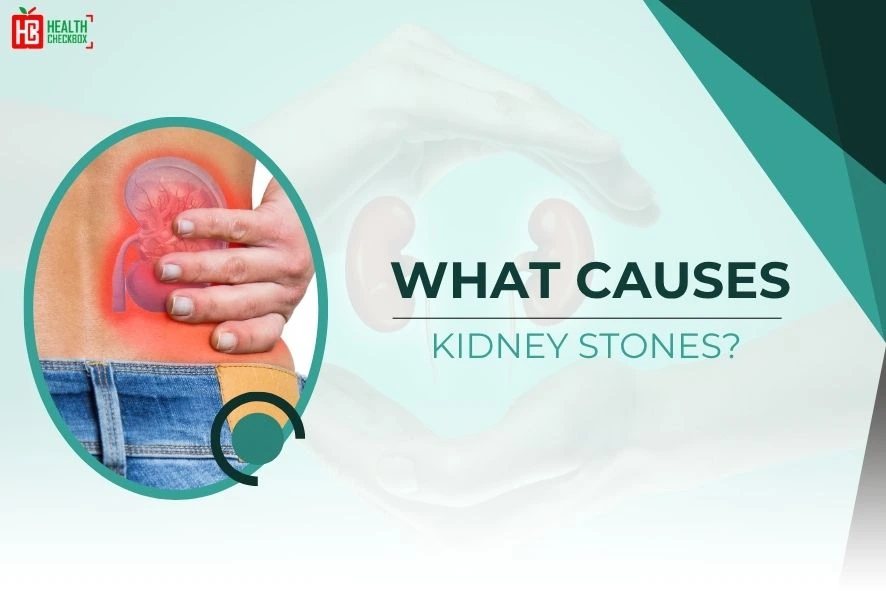Kidney stone is a common problem that comes under the urology departments. This problem can be seen in many people due to multiple causes, such as dehydration, high calcium levels, high oxalate foods, and many more. At the global level, 1 out of 10 people face the problem of a kidney stone in their lifetime. It is very important to get a kidney stone treatment on time; otherwise, the condition can worsen. In this blog, we will provide you a detailed information on what causes kidney stones, including types, risk factors, and prevention tips.
What are Kidney Stones?
Kidney stones are hard objects which is made up of calcium and oxalates. These stones commonly form inside the kidney. These stones can be of many sizes, like some stones are as small as mustard seeds, and some are as big as a pea. The problems are mainly created by big stones because they restrict the functioning of the kidney and urinary tract. Multiple medicines can cause kidney stones, so reducing their consumption can reduce the chances of kidney stone formation.
Types of Kidney Stones
Here are main 4 types of kidney stones given below:
- Oxalate of Lime: These stones are mainly formed due to a mixture of two salts, calcium and oxalate, in the urine.
- Gouty Nephropathy: These stones are formed due to an increase in uric acid in the body.
- Infection stones: These stones are formed because of a urinary infection, which is mostly seen in females.
- Renal calculi: It is a type of stone that is formed by the amino acid. This is mainly caused by a genetic disorder.
What Causes Kidney Stones?
Here are some causes of kidney stones:
Dehydration
It is a common cause of stone formation in the kidneys because, without fluid kidneys increase the levels of highly concentrated minerals and salts in the urine. These salts and minerals then form a favorable environment for crystal formation in the kidney. Then these salts combine and form stone in the kidneys. Staying hydrated in this situation is best because it prevents the clumping of salts that form stones. It is best to drink 2 liters of water on a daily basis to reduce the chances of stone formation.
High Oxalate Diet
This is another cause of renal stone because in a normal or balanced diet kidney filters all minerals and salts properly, but when you consume a diet having high oxalate levels, then the problem arises. The high oxalate levels in the diet combine with calcium and form crystals in the kidneys. So it is best to avoid high high-oxalate diet and follow a kidney stone diet chart, which can help you in consuming a balanced diet.
Obesity
It is a home of many diseases, and one of them is a kidney stone. An increase in body size and weight can result in higher calcium & oxalate levels in the kidneys. These calcium and oxalates then combine and get strong and hard. Over weight mainly disrupts the balance of essential salts and minerals in the urine. So if you want to overcome these causes, just get fit on time and do exercise for faster results. Eat a balanced diet and stay hydrated.
Genetics
In some people, genetics can be a problem with renal stones. In this case, genetics disrupts the supply of minerals in the body, which results in higher salt in urine. These slats are then converted to crystals and form renal stones. In this case, you can consult with your doctor to control the formation of kidney stones in your body.
Medical Conditions
Certain conditions, like renal cysts and diabetes, can be a cause of renal stones in the body. So it is very important to control your diabetes and go for a kidney cyst treatment. These treatments can reduce the problem of stone formation in the kidney.
High Calcium Levels
The more calcium levels present in your body, the higher the chances of renal stone buildup in the body. Stone formation started when two salts combine in urine and form crystals, which is the main reason for renal stones. So it is important to consume those foods that contain less calcium.
Tips to Stop Renal Stones
Here are some tips to stop renal stones:
- Drink Water: To stop kidney stones, it is very important to drink water. Drinking water helps in removing small stones from your body and helps the kidneys in the filtration process. It also reduces the high concentration levels in the body.
- Eat Healthy Food: Eating healthy food is best for healthy kidneys. Reducing the amount of salt in the diet can stop renal stones.
- Use of Medication: Taking medication is important sometimes, but taking higher doses can cause renal stones. So it is very important to avoid taking medicine for normal problems.
Foods that can Cause Kidney Stones
Here is the list of foods that can cause kidney stones.
- Spinach
- Beets
- Nuts (especially almonds & peanuts
- Red Meat
- Salt (sodium)
- Chocolate
- Soda (especially cola)
Conclusion
Renal stones can be a serious health condition, but by using accurate prevention tips, you can overcome this problem. In this blog, you gained information about important terms regarding renal stones, including their causes. If you are suffering from renal stones, you should seek medical care for an accurate treatment.

